#they're both Catholic alcoholics i could make it work
Text
My brain wants so badly to fixate on Leverage and 9-1-1 right now which is creating some uh interesting crossover ideas
#thus far: post s5 nate and sophie visit LA and nate meets bobby#they're both Catholic alcoholics i could make it work#anyway Bobby invites Nate and Sophie over to have dinner with him and his cop wife#also Josh/Mr Quinni even though the last time Josh went on a date with a criminal it went Badly#and Breanna/May because why not#not all in one fic of course#leverage#9-1-1#911 abc
10 notes
·
View notes
Note
Until a few minutes ago I've never thought about Trapcahy but it seems intriguing tbh. Can you maybe share a few Trapcahy moments to get me started?
(Also I'm totally looking forward to the Trapcahy spanking fic now!)
Oh my god, hi, thank you for giving me an excuse to talk about them! Admittedly Trapcahy is a crackship that got wildly out of hand so there isn't actually a ton to point to in the show itself, a lot of it is just extrapolating, but they definitely have their moments that you can watch with shipping goggles on. Also sorry this is so many words, you activated my trap (heh) card. The important bits are in bold.
I tried to pick a top three episodes, but really it's a top four: Requiem for a Lightweight, Showtime, Life With Father, and Alcoholics Unanimous are probably the ones that give us the most to work with in terms of their dynamic. But they have lots of little moments sprinkled throughout the show! Trapper "shooting craps with the chaplain" (😏) in Sometimes You Hear the Bullet, their conversation in Mail Call, the opening scene of Rainbow Bridge ("Be good, and if you can't be good, be careful." "Aren't we lucky to have such a nice Father?"). Mulcahy watches Trapper make out with a nurse in L.I.P. (twice if you count Bulletin Board) and Trapper feeds him by hand in House Arrest and kisses his cheek in Kim. And I can't for the life of me remember the episode, but there's a scene where Trapper is pouring Mulcahy a drink at a party, and he says "Not too much, I'm praying later :)" and Trapper gives a side glance as if he'd been thinking he was about to get laid this whole time. (EDIT: It's Dear Dad Three!)
But mostly what interests me about Trapcahy is more their potential than what we actually see on-screen, just due to the relatively low-drama, ensemble nature of the seasons of MASH that Trapper was actually in. It's never explicitly stated in the show, but it's heavily implied on a number of occasions that Trapper was raised Catholic and now has a rocky at best relationship with the Church; I'm also very interested in the reading of Mulcahy as a closeted gay man, but each of those could be an essay unto themselves. The way I see them, they're two people with the specific experience of growing up both queer and very Irish Catholic in a big city, surrounded by suburban WASPs, and that gives them the unique potential to both heal and hurt each other in a way I don't think any other shipping partner could give either of them. They're mirrors in a way, two wildly different individuals that are the product of incredibly similar circumstances, and I think that's a fascinating space to play in!
27 notes
·
View notes
Note
I had a question (stemming from being a hijabi) about Zed and the head coverings, you mentioned that there would be situations where they wouldn’t wear it? Also, I don’t see many problems with including hijab as long as there are situations we aren’t forced into that go explicitly against our beliefs (i.e. having to drink alcohol, going to a bar,etc.) alternatively if you don’t want to make it religious at all maybe just not call it hijab? Plenty of people in Muslim majority countries wear a scarf/sheila for cultural reasons
Ah see, that's the vital context I need, because outside of context they're just all grouped together as headscarves and so I assume the terminology is all referring to the same thing, you know? I only delineate between religious and cultural because of the idea that someone may be non practising but still like, observant? So I thought that cultural could then imply both religious reasons (depending on the person picking the option, obviously) and personal observance, but if I understand your message then maybe that's not the way to go? Would it be more accurate to then specifically separate cultural and religious?
I should say, it won't necessarily come up in the sense that you're asking. Regardless of how it gets laid out, a character wouldn't automatically drink or eat something without the player personalizing that: so there'd be no instance where you'd assert that you wear a hijab and then I obligate you to do shots, you know? So specifying religious wouldn't change the game in a significant way, I don't think: even if I added some sort of daily ritual that could include prayer, I would allow the player to pick that even if they hadn't specified that they're wearing anything religious. This is an aesthetic choice meant to modify dialogue other people have with you about your clothes.
Another thing that just occurred to me based on your message, but I imply that Zed isn't wearing a specific and identifiable covering, but is still covered (so, none of the ROs would be able to look at Zed and see any specific headscarf: this is because Trigger specifically acts very suspicious and I didn't want to imply that a) headscarves are so uncommon that any of them wouldn't be able to look at you and identify the reason you're covered, and b) to specifically change dialogue around Zed becoming uncovered far into the future, and dialogue about it being odd that Zed is covered. So, if I have a Zed based on myself, I can assert that I'm not usually covered, but also that I refuse to get less covered: this let's people (Trigger dsjkfhsdkjf) react to me suspiciously, because there's nothing inaccurate or offensive about asking me that. A Zed based off yourself, though, could assert that they're also usually covered but not usually in the manner that you are (because as I've mentioned, Zed is COVERED, to the point where they're wearing like work gloves—anything I do in the future with Zed's reveal will be a) voluntary on the part of the player, and b) take into account that some people can be obscured from view in a similar way) and Trigger will stop bringing up the fact that you're covered, because he understands now and that's a fuckass rude question when you've been told. Also, just for clarity's sake, HE brings up the fact that you may be covered for a reason, there's no like...racism interlude.
Would that not work, though? I preface this by saying that everything I know about other religions was taught to me by Catholics who had no business teaching me math let alone about other cultures, and they were frequently and identifiably wrong in a lot of ways so I'm sure that extended to stuff I didn't know they were wrong about. But it was my impression that the specific coverings were designed to cover rather than with any like meaningful specificity. From this logic, I gleaned that a Zed that's wearing like, a hoodie with a big hood and their hair wrapped and put away underneath (and still not visible to anyone looking at them) could also assert that they would normally be wearing a formal headscarf, but didn't want to get any of theirs dirty in the woods to explain why they weren't wearing one. Is this not accurate? Would it need to be the specific headscarf (although obviously idt you're like, an expert on all of them) and then they would have one that's specifically for dirty chores? This question kind of delves into speculation because for normal people who live in the right now where fabric isn't necessarily rationed in the same way the answer would probably be obvious, but I don't want to imply the incorrect thing about anyone yk?
Thank-you for responding, you brought up a lot of good points. I totally understand if you don't have the bandwidth to indulge me this far but I can check some stuff out on my own as well if you don't. 💚
18 notes
·
View notes
Text
Fleabag Season 2: A Discourse on Love
Finally caved and watched season 2 of Fleabag. And I say caved as if I haven't been waiting for this show to come back for a solid 2 years...but I was saving it for a day when I truly needed something to rival my own stuff. I knew Fleabag would, because it had when the first season premiered in the US. The poetry of the show really has a way of putting some things into perspective. Season 1 seemed like a discourse on friendship, grief, guilt and self-worth. Season 2 felt like a discourse on love. There will be spoilers.
Firstly:
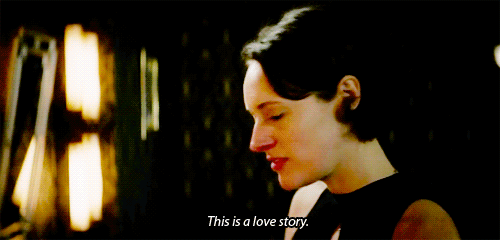
This season was a love story. Not the storybook, happily-ever-after love (There are no happily-ever-afters in Fleabagland, just there-will-be-pain-but-it-will-get-better-afters), but love in all it's grotesque complexity. After watching the season I took the "this is a love story" opener to not just be about Fleabag's ironic love for the Catholic Priest, but loving yourself (Belinda's monologue, Claire's haircut, Fleabag's new care for herself), familial love (Fleabag's relationship with her sister and father), Martin's love for Claire, and Claire's love for her work and Klare (Claire/Klare will never not be funny and cute). And the Godmother "loves" the Father and art but really I think she just loves attention and the idea of eccentrism.
The first episode hits you hard. It takes place over a year after we leave Fleabag at the end of season 1, and she's doing well, as is the guinea pig café. She is seemingly no longer blaming herself for Boo's death, no longer using sex as a form of escapism, and genuinely valuing herself. We once again get to voyeur through some of Fleabag's life moments. When it all kicks off we go from insufferable family dinner/engagement party for the Dad and the Godmother (who I didn't even remember were not married) with the Catholic Priest they got to marry them, brother-in-law Martin who we despise and the sister we haven't spoken to in over a year; to a tragic and intimate scene in the restaurant bathroom between the two sisters, and almost immediately back to the awkward dinner table where all hilarious hell breaks loose. This formula continues, as it did in the first. If you're not laughing, you're wanting to cry. Such is life, I suppose.
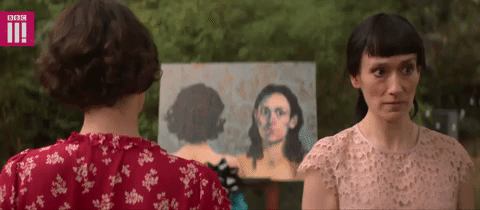
You get a little more context this season behind Claire and Fleabag's relationship. Like all relationships its complex (I feel like there were times when it felt like my relationship with my older sister), but there is love there. So much love. In the bathroom scene in the first episode it is obvious Fleabag is concerned for her sister, while her Claire is distraught, embarrassed, and eventually we come to find out relieved. When they get back to the table and Martin makes remarks that are clearly only hurting the Claire's feelings, Fleabag intervenes because she loves her sister and doesn't want to see her suffer anymore that night. Championing Claire to leave Martin (was rooting for this), that was love. It was obvious Martin loved Claire, he says as much in the scene, but they were not right for each other. Just because you love someone doesn't mean you're meant to be (something we get shown more than once in the finale). A defining moment in their onscreen relationship is when Claire says to Fleabag that the only person she'd run through an airport for is her. A few episodes before this scene we'd learned that what always looked like disdain on Claire's part was jealously and resentment stemming from her own feelings of inadequacy. By the finale I feel like Claire had gotten over some of those issues. When she leaves the wedding for the airport (guess there was someone else she would run through an airport for), I was cheering for her. Phoebe and Sian have so many dynamic scenes together that wouldn't work if the two didn't have amazing chemistry. I love them as sisters, and I love the characters' relationship.
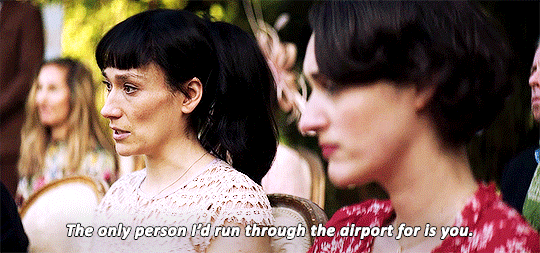
Speaking of chemistry:

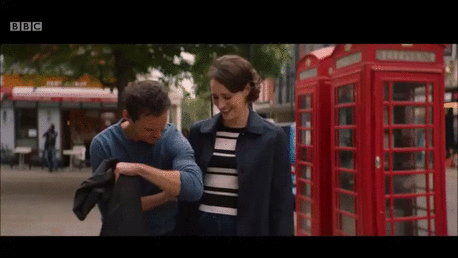
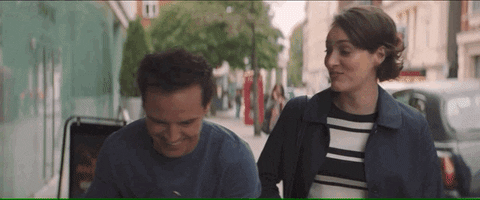
Of course, Fleabag would fall in love with the emotionally unavailable. Phoebe and Andrew's chemistry is so good. They played easily off each other's quirks and The Priest sees Fleabag in a way the other characters aren't able to (he notices her zoning out/fourth wall breaks). I could've watched this relationship play out for years. But alas, some things aren't meant to be.

It was obvious the two would end up together, just as obvious as it was that they were never going to last, as friends or a couple. When Fleabag breaks the fourth wall early on she says "we'll last a week". They're both a little dysfunctional, and we never fully get to hear why The Priest is the way he is (he always gets cut off when he tries to explain his past, only getting as far as "When I was a child..." and that he wasn't close to his mother). Through their relationship though, we see that even though it's been some time Fleabag is in fact still coping with the death of her mom and Boo. I feel like part of what she was looking for in their relationship was reassurance, as she turned to the Bible and prayer (something she would never have done previously, as an atheist), where she would normally have only turned to sex and alcohol or other ways to harm herself. When she and The Priest finally do have sex, we the invisible friend have our view almost immediately cut off. Has Fleabag ever done this? She usually narrated her sexual exploits. I feel that adds to the fact that this intimacy with the Priest was love, not a means of escape like the other times.
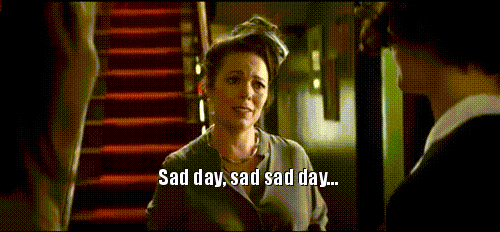
What I said earlier about the Godmother I say with a tiny grain of salt because I do realize that it's all subjective. We only see Fleabag's point of view. However, she's still the worst. She collects "friendships" like commodities and talks about them in terms of listen descriptors, most clearly shown when she introduced people in the finale. There is no real redeeming of the Godmother for Fleabag after she went from being the Mother's "best friend" to the Father's special someone. And it's hard to tell if the Father really loves her or if he's afraid of her/afraid of being on his own. Fleabag has a lovely heart to heart with her Dad (which acted also as a callback to a scene a few episodes earlier at the mother's funeral) in the finale where in a foreboding moment he says to her "I think you know how to love better than any of us. That's why you find it all so painful." Fleabag replies to us voyeurs tersely, "I don't find it painful". She definitely did. Look at the way she dealt with Boo's death. Yes, there was guilt, but she loved her. She loved her mother and having to see her Godmother with her Father, and being told snyly says she modeled the bust after her mom, her reaction...that's pain from love. We know Fleabag's love and grief for her mother were just as strong as the love and grief she had for Boo. In a flashback scene to after her mother's death, she tells Boo she doesn't know what to do with all the love she felt for her mom and how painful it is. Boo says to give it to her, she'll take it. Boo was a real one. I don't remember Fleabag breaking the fourth wall in these flashback moments (maybe I need to watch it again), but that got me thinking that we're probably taking the place of Boo. The person she lost who shared her laughter, her love, and her grief. We're her echo.
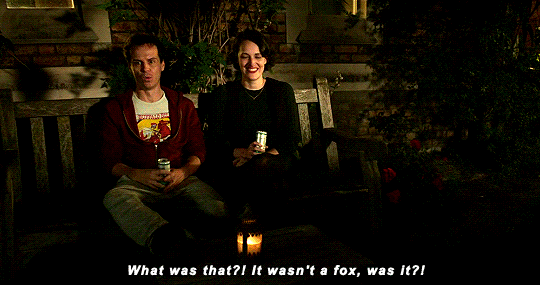
The final scene is heartbreaking to watch play out. You kind of know it's coming especially during his wedding speech, which he seemingly recited to her. The whole season spanned such a short period, but there is an immediate investment in what could be between these characters, and for the Priest this was the only real way this could end. There was no way he was leaving the priesthood. He warned her and thus we were warned, but we don't listen when it comes to the things we want. I was sad for her and him, but as Brittany Howard sings out to the credits (and The Priest's fox-foe pursues him); with a shake of the head that says "you don't need to follow me" and a wave goodbye we, the invisible friend, are reassured she's going to be alright. This was a wonderfully poignant way to end the series. It basically ended as the pilot ended, Fleabag on her way with the stolen bust of her mother in hand. I don't think it could've ended any better.
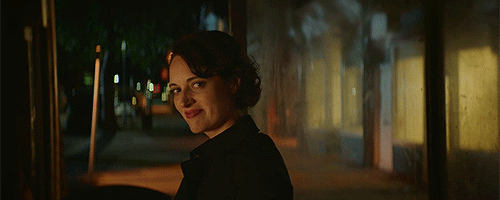
*I've had this in my drafts for maybe six months, started a new blog, decided to finally edit and post it. If you're reading this I hope you enjoyed it. -S*
#Fleabag#Fleabag x the Priest#Phoebe Waller-Bridge#Andrew Scott#Olivia Coleman#Amazon Prime#Sian Clifford#love#grief#friendship#TV
25 notes
·
View notes
Text
Dr. Bryan Santin,
English Department
F. Scott Fitzgerald, This Side of Paradise

Today, when readers of American literature make grand claims about F. Scott Fitzgerald as a novelist, they're usually referring to The Great Gatsby. During his own lifetime, though, the novel that inspired lofty declarations about the "Jazz Age" and the "Lost Generation" was not Gatsby (which sold dismally), but Fitzgerald's first novel, the 1920 bildungsroman This Side of Paradise. Thirteen years after its publication, Gertrude Stein's assertion was unequivocal: "it was this book that really created for the public the new generation."
Controversial at the time for its racy depictions of "necking" in cars and "petting" at parties, This Side of Paradise was either denounced or celebrated, according to the literary scholar Sharon Carson, as a kind of anthropological "handbook of modern morals" for the young. Indeed, the novel was such a cultural phenomenon that Fitzgerald himself, in one of the greatest moments of artistic chutzpah in the entire American canon, has a character in his second novel, The Beautiful and the Damned (1922), reference the book's generational popularity: "My God! Everywhere I go some silly girl asks me if I've read ‘This Side of Paradise.’ Are our girls really like that? If it's true to life, which I don't believe, the next generation is going to the dogs."

Although Fitzgerald occasionally ironized the notion that the Post-World War I generation was “going to the dogs,” dedicated readers know that he was, in fact, obsessed with making the Lost Generation's unique form of spiritual “lostness” legible to the wider public. Toward this end, Fitzgerald tells the story of Amory Blaine, a “romantic egoist” who attends an elite prep school and then spends several years at Princeton University engaging with weighty philosophical questions before World War I cuts his education short, and he joins the war effort. After having his heart broken by Rosalind—a character based on Fitzgerald’s real-life wife Zelda, and not coincidently, the best archetypal representation of a flapper in Fitzgerald’s early work—Amory joins the hordes of aimlessly intelligent young men roaming New York City at the dawn of the Jazz Age.
By the end of the novel, Amory comes to understand that he belongs to “a new generation dedicated more than the last to the fear of poverty and the worship of success; grown up to find all Gods dead, all wars fought, all faiths in man shaken.” For readers today, this mode of deep existential questioning is what makes This Side of Paradise such a fascinating piece of (nearly forgotten) American literary history; not the depictions of university life in the early twentieth century, although it is arguably the first literary “campus novel” proper; not the risqué flapper characters who drink alcohol and use men like “vampires,” as one character describes a flapper’s female agency; not even the emergence of the Fitzgeraldian master trope of plutocratic wealth as both disgusting and attractive, the privileged classes being a group whom Fitzgerald could not help but critique and idolize simultaneously. Rather, what makes the novel truly worth reading is how Fitzgerald traces a particular form of modernist anxiety: the Nietzschean notion that if “God is dead,” then human life is essentially meaningless, “a damned muddle,” in Amory’s words, “a football game with everyone off-side and the referee gotten rid of.”

From a twenty-first century vantage point, we can see that Amory stumbles upon Charles Taylor’s insight in his philosophical treatise A Secular Age (Harvard University Press, 2007): that the major epistemological assumptions of Western modernity are themselves underpinned by, what Taylor calls, “the immanent frame.” Rather than an explicit set of beliefs, “the immanent frame” is the deep contextual background in which beliefs develop; more specifically, it is a constellation of axioms that reveal a seemingly natural, immanent world over against a supernatural, transcendent one. Painfully, Amory realizes that within “the immanent frame,” if the mere desire to believe in the Christian conception of God appears like a childish fantasy, then the desire to know that God appears even more delusional, the ultimate Freudian wish fulfillment in its pathological intensity. For instance, although Amory grows up an Irish Roman Catholic, by the time he gets to college, he thinks silently to himself that he “was not even a Catholic [anymore], yet that was the only ghost of a code that he had.” Ironically, Amory identifies Christianity as a bulwark against his own experience of nihilism, but he feels as if making the necessary leap of faith would annihilate the intellectual self-respect he gained at Princeton. Amory’s tragic contradiction is precisely why this novel seems so alive today, why Fitzgerald’s early prose still seems blood-warm.
Ultimately, all of this is just to say that while The Great Gatsby is an all-around superior novel, This Side of Paradise is the philosophically deeper, more problematic text. Fitzgerald’s obvious masterpiece, The Great Gatsby feels like a novel written for a night of cocktails at Jay Gatsby’s West Egg mansion—that magical kind of night, as Nick Carraway says, where “men and girls came and went like moths among the whisperings and the champagne and the stars.” Conversely, Fitzgerald’s first angst-ridden novel about the malaise of modernity, This Side of Paradise feels like a novel written for a different kind of night—the kind of night that the sixteenth century Spanish mystic St. John of the Cross famously called “the dark night of the soul.”
1 note
·
View note